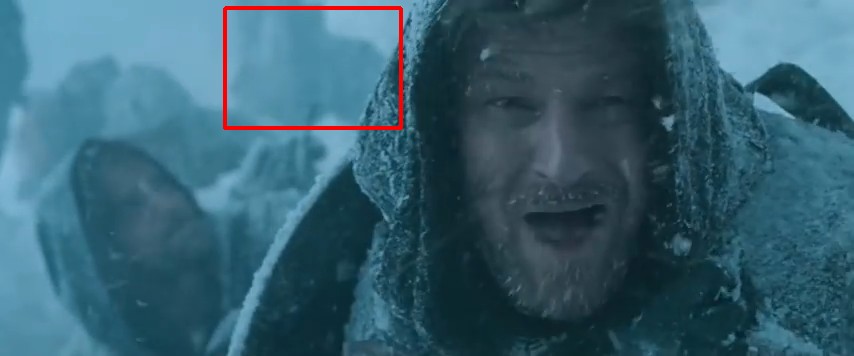There doesn't seem to be any reason to believe that any "creature" was involved in the events upon Caradhras. It appears that the culprit was most likely either the mountain itself or the weather.
All quotes below are taken from the chapter The Ring Goes South in the book The Fellowship of the Ring.
Gimli clearly supports the "Caradhras is a jerk" theory:
"’Caradhras was called the Cruel, and had an ill name,’ said Gimli, ’long years ago, when rumour of Sauron had not been heard in these lands.’"
And:
"’Caradhras has not forgiven us,’ he said. ’He has more snow yet to fling on us if we go on. The sooner we go back and down the better.’"
And:
"’It was no ordinary storm. It is the ill will of Caradhras. He does not love Elves and Dwarves, and that drift was laid to cut off our escape.’"
The narrator seems to agree with Gimli at times:
"And indeed with that last stroke the malice of the mountain seemed to be expended, as if Caradhras was satisfied that the invaders had been beaten off and would not dare to return. The threat of snow lifted; the clouds began to break and the light grew broader."
And:
"A cold wind flowed down behind them, as they turned their backs on the Redhorn Gate, and stumbled wearily down the slope. Caradhras had defeated them."
Gandalf briefly considers the possibility that Sauron is to blame, but quickly changes his tune and says it is just a plain old storm.
"’Winter deepens behind us,’ he said quietly to Aragorn. ’The heights away north are whiter than they were; snow is lying far down their shoulders. Tonight we shall be on our way high up towards the Redhorn Gate. We may well be seen by watchers on that narrow path, and waylaid by some evil; but the weather may prove a more deadly enemy than any.’"
Boromir agrees:
"I was born under the shadow of the White Mountains and know something of journeys in the high places. We shall meet bitter cold, if no worse, before we come down on the other side. It will not help us to keep so secret that we are frozen to death."
However, Boromir reconsiders when the Fellowship is nearly smashed to pieces by falling rocks:
"'Let those call it the wind who will; there are fell voices on the air; and these stones are aimed at us.’"
Aragorn isn't so sure, but seems to humor Boromir:
’I do call it the wind,’ said Aragorn. ’But that does not make what you say untrue. There are many evil and unfriendly things in the world that have little love for those that go on two legs, and yet are not in league with Sauron, but have purposes of their own.’"
The most likely culprits in the storm atop Caradhras are the mountain itself and the weather (the latter of which is not a very exciting answer).
Passages like the following are probably intended to create uncertainty on the part of the reader, but they don't give us enough information to treat them as anything but dramatic narrative.
"They heard eerie noises in the darkness round them. It may have been only a trick of the wind in the cracks and gullies of the rocky wall, but the sounds were those of shrill cries, and wild howls of laughter. Stones began to fall from the mountain-side, whistling over their heads, or crashing on the path beside them. Every now and again they heard a dull rumble, as a great boulder rolled down from hidden heights above."
In any case, whether you choose to believe that the storm was caused by natural forces, a malevolent mountain, or something else entirely, there is absolutely no evidence that any creatures were present during the incident.

